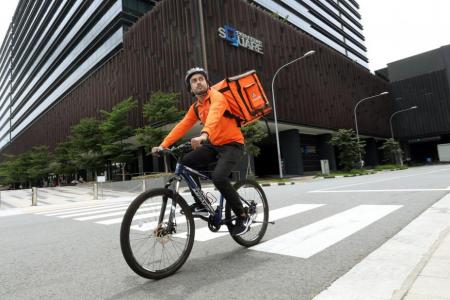Freelancers must be protected: NTUC
Labour MP Ang Hin Kee set to push for better terms for 'tied freelancers', whose numbers are growing
Despite the heavy rain on Christmas Eve, food couriers here continued to ply the slick roads even as flash floods affected some parts of the country.
Labour MP Ang Hin Kee described such workers as "tied freelancers", and he is pushing for fair work terms for the group in this year's Budget.
This includes workplace protection and medical and retirement coverage, the NTUC assistant director-general told The New Paper.
The tied freelancers hold jobs that are handled by groups of independent contractors, such as those in private transportation and food delivery.
Official figures showed that there are currently 170,000 freelancers here, but Mr Ang estimated the pool to be as big as 200,000.
He said: "How can I sit in the shelter of my home, while the food courier takes the risk to deliver food in the rain for me? It is about feeling at ease (about it)."
Here, freelancers do not have the statutory rights of employees under the Employment Act, such as overtime pay, and they do not receive statutory benefits such as Central Provident Fund contributions from the companies they work for.
They also do not have recourse in the Labour Court.
How can I sit in the shelter of my home, while the food courier takes the risk to deliver food in the rain for me?Labour MP Ang Hin Kee
Mr Ang's call for help for the tied freelancers comes in the face of a growing gig economy - one where temporary positions are common and organisations contract with independent workers for short-term engagements.
The gig economy is an "inevitable trend", said Nanyang Business School's Associate Professor Boh Wai Fong.
"We must understand the different profiles and their different needs in this group. Details beyond the number of people in this group are needed before we can jump in to ask for help," he said.
Experts TNP spoke to suggested legislating protection.
If nothing is done to protect freelancers, businesses could get away with "what could have been a genuine obligation on their part", said Mr Ang, adding that these black sheep make up the minority.
Responding to queries from TNP, employment lawyer Ian Lim said: "With the accelerating growth of the gig economy, the consequence of not having any kind of protection for gig workers will be that an ever larger proportion of Singapore's workforce will lack the statutory rights and protection that conventional employees take for granted (such as paid medical and annual leave)."
Cost a factor in any move to protect freelancers
A push for better protection at the workplace for tied freelancers is good news, especially for a freelance courier who wants to be known only as Alfred.
Alfred, who is in his 60s, works for a delivery service that links parcel senders to third-party couriers.
He told The New Paper: "Obviously, our kind of workers don't get what full-time employees get. What can we do when it comes to issues like payment delays?
"With protection, we don't have to worry anymore."
But cafe owner Ivan Lee, 35, who engages part-time workers, said there is no incentive to provide employment benefits for them, adding that any extra money forked out could cost owners of small outfits.
Nanyang Business School's Associate Professor Boh Wai Fong understands why a move to protect tied freelancers may not sit well with businesses.
Prof Boh, who lectures at Nanyang Technological University, said: "Companies will naturally resist due to cost reasons, and also to create clear delineations between such gig workers and their regular workers.
"So it is unlikely companies will voluntarily provide such protection."
She added that gig workers may have to share the cost of providing such protection, which is in line with Singapore's Central Provident Fund philosophy.
Experts believe legislation may be required to protect freelance workers.
LEGISLATION
Mr Ian Lim, who heads TSMP Law's employment and labour team, said this could be done by amending the Employment Act, or through another dedicated piece of legislation.
But he cautioned: "Any statutory rights given to freelancers would have to be carefully considered and calibrated, given the many disparate varieties of such workers across different industries."
Will recognising tied freelancers in the eyes of the law accord them better protection, much like a recent UK employment tribunal ruling in favour of Uber drivers?
It is possible, said Mr Lim, but there is a caveat.
"For this to work, it would, among other things, require a clear definition at law as to exactly who would belong to that category," he said.
Get The New Paper on your phone with the free TNP app. Download from the Apple App Store or Google Play Store now



